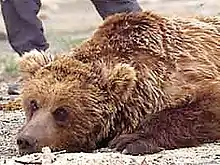Gobi bear
The Gobi bear (Ursus arctos gobiensis; known in Mongolian as the Mazaalai (Мазаалай), is a subspecies of the brown bear (Ursus arctos) that is found in the Gobi Desert of Mongolia. It is listed as critically endangered by the Mongolian Redbook of Endangered Species and by the Zoological Society of London.[1] The population included only around 30 adults in 2009,[2] and is separated by enough distance from other brown bear populations to achieve reproductive isolation.[3]
| Ursus arctos gobiensis | |
|---|---|
 | |
| Scientific classification | |
| Kingdom: | Animalia |
| Phylum: | Chordata |
| Class: | Mammalia |
| Order: | Carnivora |
| Family: | Ursidae |
| Genus: | Ursus |
| Species: | |
| Subspecies: | U. a. gobiensis |
| Trinomial name | |
| Ursus arctos gobiensis Sokolov & Orlov,1920 | |
Behaviour and ecology
Gobi bears mainly eat roots, berries, and other plants, sometimes rodents; there is no evidence that they prey on large mammals. Small compared to other brown bear subspecies, adult males weigh about 96.0–138.0 kg (211.6–304.2 lb) and females about 51.0–78.0 kg (112.4–172.0 lb).[3]
Genetic diversity
Gobi bears have very little genetic diversity,[2] among the lowest ever observed in any subspecies of brown bear. Levels of genetic diversity similar to the Gobi bears have been reported only in a small population of brown bears in the Pyrenees Mountains on the border of Spain and France.
Research
Based on morphology, the Gobi brown bear has sometimes historically been classified as being of the same subspecies as the Tibetan blue bear. However, recent phylogenetic analysis has shown the Gobi bear to instead represent a relict population of the Himalayan brown bear.[4] There are fewer than 40 Gobi bears left in the wild.[5]
See also
References
- "Chimpanzees among 33 breeds selected for special protection". BBC. 28 October 2017. Retrieved 30 October 2017.
- Odbayar Tumendemberel; Michael Proctor; Harry Reynolds; John Boulanger; Amgalan Luvsamjamba; Tuya Tserenbataa; Mijiddorj Batmunkh; Derek Craighead; Nyambayar Yanjin; David Paetkau (2010). "Gobi bear abundance and inter-oases movements, Gobi Desert, Mongolia" (PDF). Ursus. 26 (2): 129–142. doi:10.2192/URSUS-D-15-00001.1.
- "Gobi bear conservation in Mongolia" (PDF). July 2010. Retrieved 2016-03-19.
- Lan T.; Gill S.; Bellemain E.; Bischof R.; Zawaz M. A.; Lindqvist C. (2017). "Evolutionary history of enigmatic bears in the Tibetan Plateau–Himalaya region and the identity of the yeti". Proceedings of the Royal Society B: Biological Sciences. 284 (1868): 20171804. doi:10.1098/rspb.2017.1804. PMC 5740279. PMID 29187630.
- https://www.gobibearproject.org
Sources
- Chadwick, Douglas (April 2014). "Can World's Rarest Bear Be Saved?". National Geographic. Joe Riis (photography).
- "Gobi bear (Ursus arctos gobiensis)". Wildscreen Arkive. Archived from the original on 2008-09-19. Retrieved August 21, 2017.
- McCarthy, Thomas M.; Waits, Lisette P.; Mijiddorj, B. (2009). "Status of the Gobi bear in Mongolia as determined by noninvasive genetic methods". Ursus. 20 (1): 30–38. doi:10.2192/07GR013R.1.
Further reading
- Chadwick, Douglas (2017). Tracking Gobi Grizzlies: Surviving Beyond the Back of Beyond. Joe Riis and Douglas Chadwick (photography). Ventura, Cal.: Patagonia Books. ISBN 9781938340628. OCLC 984164885. Preview.
